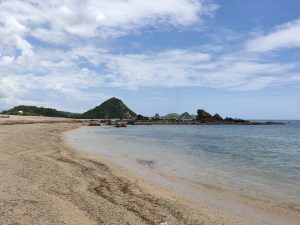Bali’s resort enclave of Nusa Dua traces its roots back to the 1970s, when a state-owned company called the Bali Tourism Development Corporation (BTDC) was tasked with managing a plot of land in southern Kuta and coordinating its metamorphosis into a premier hotel development complex. At the time, Bali was not the booming tourist hub that is it today and so BTDC’s role was to reassure skittish investors looking to get into the local market that the full force of the Indonesian state was backing the project. As part of that brief, BTDC built out and provided good quality infrastructure and amenities that would make Nusa Dua an attractive option for global hoteliers.
And it worked, insofar as the goal was to court foreign investment and the construction of luxury hotels that would draw in high-dollar, mainly foreign, vacationers. The key role of BTDC also reflected the New Order’s preferred model of economic development, one that mixed state control with private capital. This model of development is still popular in Indonesia, and so it’s no surprise that policymakers have been trying to replicate the success of Nusa Dua elsewhere.
On the neighboring island of Lombok, this has taken the form of the Mandalika development project. Mandalika was first conceived during the administration of President Susilo Bambang Yudhoyono, and the goal was to create another luxury hotel enclave like Nusa Dua. In 2008, it was announced that BTDC was entering into a deal with Emaar Properties, a real estate developer from the United Arab Emirates, to build a $600 million luxury resort in Lombok.
After the Global Financial Crisis, Emaar pulled out and the BTDC took over as the main administrator of the project. In 2014, Mandalika was named a Special Economic Zone to encourage investment. As in Nusa Dua, BTDC, now rebranded the Indonesian Tourism Development Corporation (ITDC), would basically act as an all-purpose troubleshooter and project developer. In 2017, President Joko Widodo made Mandalika a priority destination and put the full weight of his government behind its development.
Officials set expectations sky high, suggesting the project would create 58,000 jobs, help bring in 2 million foreign tourists per year and potentially generate over 28 trillion rupiah worth of investment (nearly $2 billion at current exchange rates). It would involve the construction of numerous luxury hotels as well as a MotoGP racing circuit. So far, these expectations have not been met.
According to Indonesia’s Investment Coordinating Board, from 2018 to 2020, Central Lombok Regency (where the 1,175 hectare project is located) booked $78.5 million worth of foreign investment in the hotel and restaurant sector. Room capacity has increased, which shows that there is investment and construction activity taking place, but not quite at the scale or pace that was envisioned and not necessarily in the high-value luxury hotels that ITDC is targeting. Construction of the Moto GP racetrack has also been slowed down by land disputes
The pandemic has obviously put foreign tourism on ice for the time being. But even prior to that foreign visitors to Central Lombok peaked at 552,177 in 2017 before dropping significantly after the Lombok earthquake in 2018. ITDC has spent millions of dollars building out public infrastructure for the project, but as of now the streets are not yet lined with exclusive 5-star hotels.
In part this is because ITDC’s role as project coordinator is creating confusion over regulatory and planning authority. Research from Syarif Hidayat and Siwage Dharma Negara recently showed that local officials were being pressured by ITDC not to issue licenses or permits for any 5-star hotels outside of the Mandalika development zone. Because ITDC is an autonomous quasi-government entity embedded inside the existing local government structure, instead of jump-starting private investment it is actually distorting the market by trying to force capital into the state’s preferred development zone.
In the 1970s, it made sense for an agent of the state to set up and manage a pioneering hotel development project in southern Bali. In fact, this was probably needed at the time to induce growth in an unproven market. But times have changed. The tourism industry in and around Bali is a vibrant, competitive market. The state no longer needs to take such a direct role in managing land and finding private investors for big developments.
It would probably be better served by improving the overall regulatory environment so that investors can build hotels wherever they think it makes the most economic sense. By trying to force the issue with Mandalika, ITDC is actually making the market less efficient. And while the promised investment may one day materialize, and the MotoGP circuit will attract crowds when the pandemic is over, this mix of state control and private capital that worked in the 1970s era tourism scene may not be quite the right fit for these times.
































